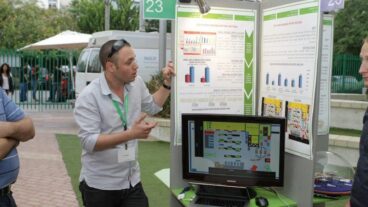If the high tech and biotech industries are the engines that have been driving the Israeli economy over the past five years, it is the nation’s universities that have provided the fuel: brainpower.
Behind nearly every Israeli business success story is an idea which born in a laboratory in one of the country’s impressive institutions of higher learning.
Innovation at Israeli universities, of course, is nothing new. But what has rapidly improved has been the journey from university to the marketplace. Once a rough and rocky path filled with obstacles, the road to commercialization has become smoother and more efficient, thanks to the level of assistance and support provided by the universities themselves.
The past five years has seen a blossoming and expansion of what are known as technology transfer companies: businesses housed on campus that are devoted to taking the products of the university’s minds, presenting them to the business world, and guaranteeing, with its proactive role, that the universities benefit financially from the ideas that they foster.
Israel’s best-known technology transfer company, admired and imitated around the world, is the Weizmann Institute’s Yeda Research and Development. Yeda has not only generated millions in revenues that have been poured back into the university, but more importantly, has introduced products and devices to the world that have revolutionized medicine and saved lives.
Weizmann is not only held up as an example within Israel, but is held in tremendous esteem internationally – demonstrated when it was voted the best university in the world for life scientists to conduct research in a poll among more than 2600 academics by The Scientist magazine
“The Weizmann Institute of Science attributes much importance to the work environment and the conditions which are made accessible to the scientists, in particular to the young scientists, to enable them to use their full potential for the benefit of humanity,” said Prof. Ilan Chet, President of Weizmann.
Providing such an environment has benefited both the scientists and the university, which shares in the profits earned from the Weizmann faculty’s innovations. Weizmann has become a world leader in the commercialization of patents. In 1988, revenues from royalties were $1 million; in 1998, $16 million; in 2003, $93 million.
Yeda now registers about 80 patents a year, 75 percent of them in the life sciences. In all, Weizmann scientists have been responsible for well over 1,000 registered patents, many of which have been developed commercially.
Among its licenses are two of the four drugs used in the United States and worldwide to treat multiple sclerosis – Copaxone made by Israel-based Teva Pharmaceuticals, whose annual sales top $360 million, and Rebif, made by Ares Serono of Switzerland and developed by its subsidiary Interpharm, whose sales exceed $370 million.
In the fight against debilitating ostereoporosis, Weizmann researchers discovered Vitamin Alpha D3, a molecule that protects against brittleness as well as loss of bone mass. It is produced under license by Teva pharmaceuticals.
A vaccine for Hepatitis B (contracted from unsterile needles, and/or during blood transfusions) is another product developed by Weizmann scientists. It was the first blue and white vaccine submitted and approved in Israel. Licensed to Bio-Technology General, it is registered and sold in Israel, Vietnam, the Philipines, Singapore, and Hong Kong.
In the field of technology, a Weizmann success story that cannot be ignored is the “smart card” for encoding satellite communications. Built on a coding algorithm based on multiplications of prime numbers, which was developed at Weizmann by renowned Prof. Adi Shamir, the idea grew into Jerusalem’s successful NDS company, whose product is used by Direct TV in the United States and by the Israeli YES satellite company, among others.
NDS is the leading global supplier of open end-to-end digital pay-TV solutions for the secure delivery of entertainment and information to television set-top boxes and IP devices. NDS enables broadcasters, network TV operators and content providers to profit from the deployment of digital TV technologies including innovative solutions for personal TV, interactivity, secure broadband, home networks, and content on the go.
NDS’s technology makes the viewing experience more engaging, informative and entertaining, offering audience building interactive TV events like the FIFA World Cup and NFL Super Bowl, or delivering the most popular services and merchandise at the click of a button, like QVC’s buy button, home banking, shopping and Internet services that are fast, secure and easy to use.
While Weizmann’s Yeda is probably the best-known institution producing top-class research and commercializing some of it, it is far from alone. Tel Aviv University’s Ramot, Hebrew University’s Yissum, the Bar-Ilan Research and Development Company, and the Technion Research and Development Foundation.
In the southern part of the country, the Israeli government is betting the future of the whole region on the fruits of the minds doing research at Ben-Gurion University and commercializing through B.G. Negev Technologies.
In November 2005, the Israeli government committed to providing $30 million towards a $90 million research fund for the new National Institute for Biotechnology in the Negev (NIBN) based at BGU.
The NIBN is the cornerstone of a planned full-scale Advanced Technologies Park, which will hopefully spark the economic and urban development of the southern region. The park is part of a comprehensive $3.6 billion, 10-year plan to bring development to the Negev region, with an emphasis on high tech and biotech industries, but involving all aspects of life in the Negev, including infrastructure, housing, education, and tourism.
BGU’s new president, Prof. Rivka Carmi, herself is responsible for breakthrough genetic research, believes that the government’s confidence is justified.
“The next decade will be about excellent research that will place BGU among the best universities in the world,” she said.
The United States government also benefits from the fruits of Israeli research. Last year, Dr. Raymond Kaempfer of Hebrew University won a massive $5.6 million grant for work which represents an important step towards protecting the children of the future from the threat of deadly biological warfare.
Kaempfer received the grant to further his development of a broadly effective drug against a family of toxins called superantigens. Superantigens are deadly toxins produced by staphylococcal and streptococcal bacteria that even in very low amounts can incapacitate humans, posing a bio-terror threat. These toxins are also responsible for a majority of fatal toxic and septic shock cases, yet no drug or vaccine against them is available. Toxic shock, caused by staphylococci and streptococci bacteria, can kill with 24-48 hours, so quickly that diagnosis of the responsible agent is not possible.
The award to Kaempfer, the Philip Marcus Professor of Molecular Biology and Cancer Research in the Department of Molecular Virology at the Hebrew University Faculty of Medicine, was the largest grant ever awarded to an Israeli researcher by the US National Institutes of Health (NIH)
The US government grant funded the development of the biodefense drug, while work is ongoing at Atox Bio, a company set up by Kaempfer and the Hebrew University’s technology transfer company, to use the knowledge gained in this research to create drugs for medical needs – the treatment of autoimmune diseases and septic shock. The goal also becomes developing and commercializing treatment for toxic shock.
The past five years have been a remarkable period of world recognition of the high level of Israeli research, with no better proof than the frequency with which Israeli professors have taken to the Israel’s stage in Stockholm, where the Nobel Prizes for the most important work of our time is handed out.
Two Israelis were part of a team that won the 2004 Nobel Prize for Chemistry for helping to understand how the human body gives the “kiss of death” to faulty proteins to defend itself from diseases like cancer.
Aaron Ciechanover, 57, and Avram Hershko, 67 were honored by the Royal Swedish Academy of Sciences for their work that discovered one of the cell’s most important cyclical processes, regulated protein degradation.
Ciechanover is director of the Rappaport Family Institute for Research in Medical Sciences at the Technion in Haifa, while Hershko, originally from Hungary, is a professor at the institute.
Their work, carried out in the early 1980s, shows how a molecule called ubiquitin attaches itself to the doomed protein and accompanies it “to the cells’ waste disposers,” the Royal Swedish Academy of Science said in a statement.
“When the degradation does not work correctly, we fall ill,” the academy said, but added that the knowledge of how the breakdown process works offers hope for the treatment of cervical cancer and cystic fibrosis, among other diseases.
The two Israelis said at the time they won the prize that they hope their work will lead to advances in cancer treatment. One such drug, Velcade, is on the US market, Ciechanover noted, and “there are many more in the pipeline.”
“It does not mean that a miracle drug to beat cancer is on the way, but I do believe there will be advances in the treatment of cancer based on our work. This I truly believe in,” said Hershko.
In 2003, Daniel Kahneman, an American-born Israeli, won the Nobel Prize in economics for his studies on decision-making in situations of uncertainty. And in 2005, Prof. Emeritus Robert J. Aumann of the Hebrew University of Jerusalem was named as the co-winner of the Nobel Prize in Economics.
The Royal Swedish Academy of Sciences announced that Aumann and Prof. Thomas C. Schelling of the University of Maryland would share the prize “for having enhanced our understanding of conflict and cooperation through game-theory analysis.”
Aumann is an internationally known researcher in the area of game theory. In its award statement, the Swedish Academy stated that “Robert Aumann was the first to conduct a full-fledged formal analysis of so-called infinitely repeated games. His research identified exactly what outcomes can be upheld over time in long-run relations.”
At the time of the announcement, Hebrew University President Prof. Menachem Magidor said the announcement of the prize “has brought pride and happiness to the university, to the State of Israel and to all of Israeli academia.”












